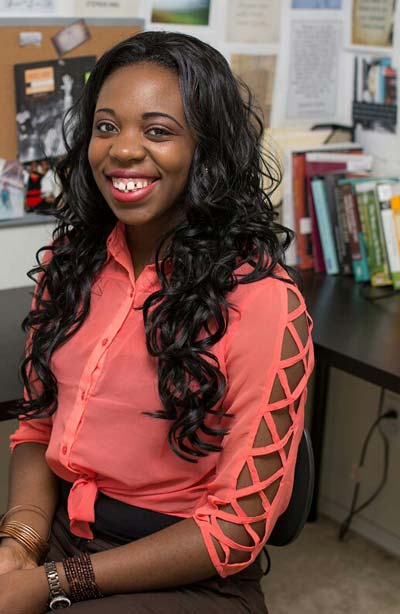What's your story?
DUNIA Magazine: Who is Déborah NK Makuma in your own words?
I’m just a young woman in love with the craft of writing. I pour out my heart and soul in my writing because it is simply my freedom of expression. I want to write what other people are too afraid to write about. Apart from writing, I also teach writing and absolutely love teaching!
Tell us about your childhood and key lessons learnt during that period.
I had a really good childhood. Half of my childhood was spent in France where I was born [to Congolese parents], and the other half in Dallas, Texas. I’ve always been a determined person, and have always had big dreams. One of the key lessons I learned in life is to always follow your dreams and to listen to your heart. Had I listened to what everyone told me I couldn’t do, I would not be here today doing this interview. I’ve always been called a “dreamer,” and it never bothered me because I knew I was unique. Pursuing a dream or passion comes with many obstacles, but if it’s something you truly love, you’ll strive until the end.
What inspires you in life and how do you keep yourself motivated especially as a woman?
So many things inspire me and help me stay motivated. Firstly, I’m fortunate to have the opportunity to do what I love. Many people do not have this opportunity, so I thank my parents for making the way for me.
It’s easy to take things for granted when you’ve never had them taken from you. So I think about the people in the world who would do anything to trade places with me—that motivates me enough. My husband also inspires me and daily keeps me motivated because he is a very ambitious person himself.
“I am who I am today because of the choices I made yesterday.” Eleanor Roosevelt. I read this quote to myself almost every day. It inspires me.
As you know, in March of this year DUNIA Magazine organized a Walk for the women of DR Congo. You have written a novel about a rape victim, what stood out most to you in the process of research and meeting these victims?
I’m glad you asked this question. I’ve been doing research for the past three years or so about the raping going on in Eastern Congo. Being that I am of Congolese descent myself, writing this novel has been so close to home. I’ve discovered and read the stories of so many raped victims.
The process was extremely difficult. Reading hundreds of stories about women who were shot in the genitals or women who were gang raped multiple times and have had objects inserted inside of them has been mortifying. I would like to clarify that these women are not only being raped, but they are being abused, tortured, and scarred for life. What stood out the most during my research was how difficult it was to write this book. At times, I was too hurt and emotional to write because those stories stayed with me—night and day. In a way, I had to become my character to be able to tell her story—snapping back to being me was the hard part.
What’s the writing process like for you?
My writing process changes depending on what I’m writing. Because of my new teaching career, I have not been able to write as much as I used to, but I try to write every other day—even if it’s only a paragraph. If I’m not writing, I’m reading something. I try to keep the creativity going one way or another. I’m a pretty fast writer, so once I make that connection with my characters, I’m on a roll until the last page. There are two kinds of writers. One writer likes to plan and outline everything ahead, while the other kind of writer simply writes and lets the story unfold. I’m the second kind. I absolutely hate outlines. I just write, and let my characters speak to me.
You were born in Paris and now live in the USA, what strikes you most about different people you have met?
I would say that people here [USA] are a lot friendlier, but less colorblind.
A few words in closing …
Thank you for taking the time to interview me. As far as my novel about the Congolese raped victim, it is untitled, “Uprooted”, and is not published just yet. Once it is, I will be glad to come back and have an interview about my novel.
In the meantime, here’s the synopsis:
Bijou Mwamba is a 22 year-old refugee who is ruined, alone, and afraid. She loses everything and almost everyone she knows after she flees from her country of birth, Eastern D.R Congo, where she was gang raped and taken as a sex slave. After living at the Nakivale Camp in Uganda for eight years, she is finally chosen for resettlement in the U.S.
Bijou comes to the Texan home of Thomas and Bethany, a seemingly loving couple who are profoundly religious. They’ve helped refugees before and Bijou believes she is finally safe from the horrors she escaped from. Only, Thomas and Bethany aren’t what they seem.
After meeting another refugee that Thomas and Bethany “helped” named Justine, Bijou learns the true extent of their evil ways. Justine’s friendship with Bijou could cost them both of their lives, and Bijou must make a choice to continue ignoring the crimes of her “saviors” or take charge of her own life once and for all.

